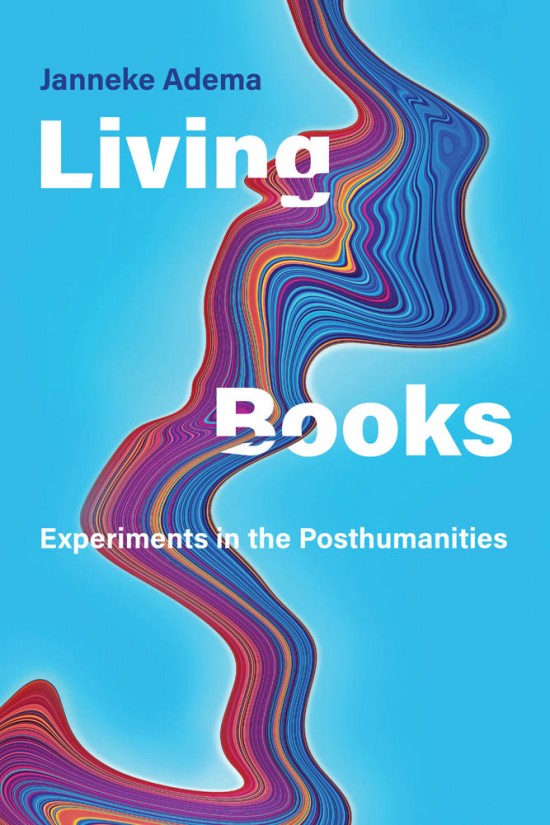Janneke Adema: Living Books: Experiments in the Posthumanities (2021)
Filed under book | Tags: · archive, authorship, book, collaboration, community, copyright, hypertext, media, neoliberalism, open access, openness, print, publishing, scholarship, university, versioning, wiki

“Reimagining the scholarly book as living and collaborative—not as commodified and essentialized, but in all its dynamic materiality.
In this book, Janneke Adema proposes that we reimagine the scholarly book as a living and collaborative project—not as linear, bound, and fixed, but as fluid, remixed, and liquid, a space for experimentation. She presents a series of cutting-edge experiments in arts and humanities book publishing, showcasing the radical new forms that book-based scholarly work might take in the digital age. Adema’s proposed alternative futures for the scholarly book go beyond such print-based assumptions as fixity, stability, the single author, originality, and copyright, reaching instead for a dynamic and emergent materiality.
Adema suggests ways to unbind the book, describing experiments in scholarly book publishing with new forms of anonymous collaborative authorship, radical open access publishing, and processual, living, and remixed publications, among other practices. She doesn’t cast digital as the solution and print as the problem; the problem in scholarly publishing, she argues, is not print itself, but the way print has been commodified and essentialized. Adema explores alternative, more ethical models of authorship; constructs an alternative genealogy of openness; and examines opportunities for intervention in current cultures of knowledge production. Finally, asking why it is that we cut and bind our research together at all, she examines two book publishing projects that experiment with remix and reuse and try to rethink and reperform the book-apparatus by taking responsibility for the cuts they make.”
Publisher MIT Press, August 2021
Leonardo series
Creative Commons BY-NC 4.0 International License
ISBN 9780262046022, 0262046024
xiii+335 pages
Interview with author: Erzsébet Tóth-Czifra (Dariah Open, 2021).
Comment (0)Joseph Michael Reagle, Jr.: Good Faith Collaboration: The Culture of Wikipedia (2010)
Filed under book | Tags: · citizendium, collaboration, wiki, wikipedia

Wikipedia, the online encyclopedia, is built by a community–a community of Wikipedians who are expected to “assume good faith” when interacting with one another. In Good Faith Collaboration, Joseph Reagle examines this unique collaborative culture.
Wikipedia, says Reagle, is not the first effort to create a freely shared, universal encyclopedia; its early twentieth-century ancestors include Paul Otlet’s Universal Repository and H. G. Wells’s proposal for a World Brain. Both these projects, like Wikipedia, were fuelled by new technology–which at the time included index cards and microfilm. What distinguishes Wikipedia from these and other more recent ventures is Wikipedia’s good-faith collaborative culture, as seen not only in the writing and editing of articles but also in their discussion pages and edit histories. Keeping an open perspective on both knowledge claims and other contributors, Reagle argues, creates an extraordinary collaborative potential.
Wikipedia’s style of collaborative production has been imitated, analyzed, and satirized. Despite the social unease over its implications for individual autonomy, institutional authority, and the character (and quality) of cultural products, Wikipedia’s good-faith collaborative culture has brought us closer than ever to a realization of the century-old pursuit of a universal encyclopedia.
Foreword by Lawrence Lessig
Publisher MIT Press, 2010
History and Foundation of Information Science Series
ISBN 0262014475, 9780262014472
244 pages
Anne Goldenberg: La négociation des contributions sur les wikis publics: Légitimation et politisation de la cognition collective (2010) [French]
Filed under thesis | Tags: · collaboration, internet, knowledge, knowledge production, participation, wiki
Les wikis sont des sites hypertextuels éditables dont chaque modification est publiquement consignée. L’usage de ces artefacts s’est notamment répandu pour de grands projets de production de connaissances (encyclopédie, documentation en ligne). Dès lors, les participants doivent s’organiser pour surveiller et discuter de ce qui constitue une contribution. Nous avons d’abord réalisé une enquête par questionnaires en ligne autour du concept de contribution suivi d’entretiens qualitatifs menés auprès des participants à trois wikis publics1. Ceux-ci l’ont défini comme une activité de production de connaissances, en tension entre intérêt personnel et collectif, besoin de reconnaissance et disposition d’anonymat et dont les principes de pertinence sont régulièrement discutées. Ces mises en débat semblent structurantes dans la mesure où les contributeurs et contributrices parviennent à distinguer ce qui relève d’une dispute sociale ou d’un débat d’ordre épistémique (relatif aux connaissances). L’usage de wikis publics dans une perspective épistémique amène les contributeurs à faire face à deux contradictions : L’ouverture à la contribution publique entre en tension avec le besoin de valider les connaissances diffusées. La participation du plus grand nombre est mise au défi par l’établissement de conventions sociales qui complexifient l’adhésion au projet. Que révèle l’étude de la négociation des contributions au regard des problèmes de justesse et de justice propre aux wikis publics ? Une analyse plus poussée de la gestion des désaccords dans les trois communautés étudiées a bien permis de relever une violence latente malgré les conventions sociales et épistémiques en place. Mais l’étude a aussi revélé l’importance du rôle des participant investis dans l’organisation, la mise en relation et la contextualisation des interventions. L’émergence d’une culture de la contribution serait ainsi tributaire d’une responsabilisation vis-à-vis des enjeux politiques et épistémiques impliqués dans la production participative de connaissances.
Sociology and Communication dissertation thesis
Faculté de communication, L’Université du Québec à Montréal et Université de Nice-Sophia Antipolis
324 pages

